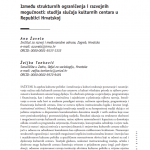
Journal: Sociology and Space
Publisher: Institute for social research in Zagreb
Year: 2025
ISSN 1846-5226 (Print)
ISSN 1849-0387 (Online)
Abstract
The infrastructure concept is intuitively understandable in everyday language and refers, for example, to water supply, electrical networks, telephone networks, public transport, bridges, tunnels, railways and the Internet. Infrastructure is a fundamental prerequisite for numerous social, political and economic processes, although we usually only notice its impact during interruptions in supply or flow. Despite the central role in modern societies, the infrastructure concept is insufficiently developed sociologically. This paper aims to offer theoretical starting points for the sociological analysis of infrastructure and to connect structure and agency through the idea of infrastructure. Such a conceptualisation is important for ontological and developmental reasons. First, it is crucial to theorise how social practices, processes and institutions are affected by the availability and functionality of different infrastructures. Second, it is important to shed light on the political economic and developmental role of infrastructure, following the various interests of infrastructure management. The paper offers a meta-theoretical review elucidating social practices and indirect social processes arising from the use of infrastructure on the one hand, and the power of the state, capital and transnational processes to shape the infrastructure supply and use on the other hand.
It is available (in Croatian) in open access at the following link: https://hrcak.srce.hr/clanak/479866



